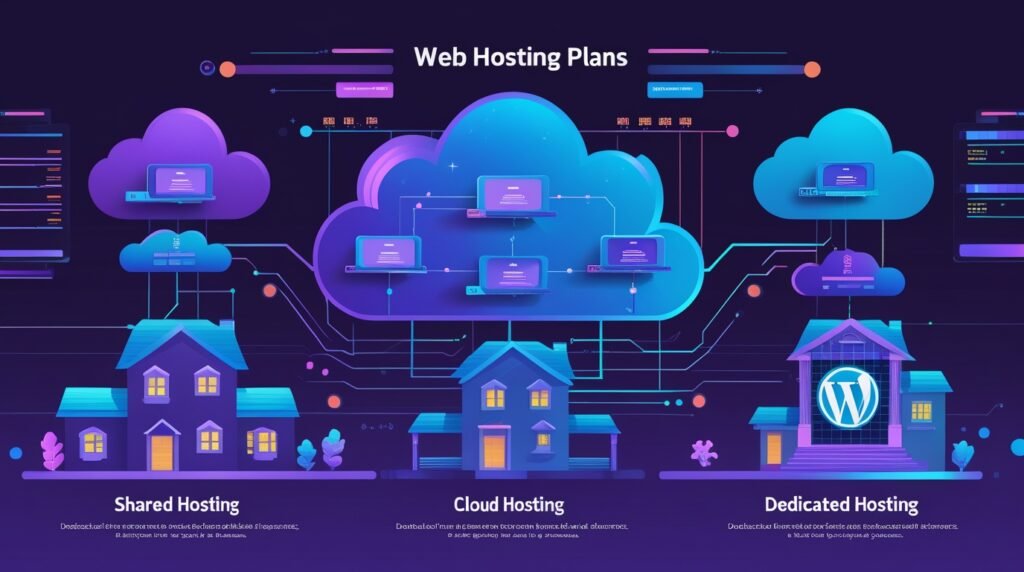How to Choose the Right Hosting Plan: A Step-by-Step Guide for 2024

One of the most crucial choices you’ll face for your website is selecting the appropriate hosting plan. Whether you’re launching a personal blog, an online store, or a business website, the hosting plan you choose will directly impact your site’s performance, security, and scalability. But with so many options available—shared hosting, VPS hosting, cloud hosting, and more—how do you know which one is right for you? In this comprehensive guide, we’ll walk you through everything you need to know to choose the perfect hosting plan for your needs. Let’s dive in!
Why Does Your Hosting Plan Matter?
Your hosting plan is the foundation of your website. It affects:
- Speed: A good hosting plan ensures fast loading times, which are crucial for user experience and SEO.
- Uptime: Reliable hosting keeps your website online 24/7, minimizing downtime.
- Security: A secure hosting plan protects your site from hackers and malware.
- Scalability: As your website grows, your hosting plan should be able to handle increased traffic and resource demands.
Choosing the wrong plan can lead to slow performance, frequent crashes, and even lost revenue. That’s why it’s essential to make an informed decision.

Step 1: Understand Your Website’s Needs
Before you start comparing hosting plans, ask yourself these questions:
1. What Type of Website Are You Building?
- Blog or Portfolio: A simple shared hosting plan is usually sufficient.
- Online Store: Look for hosting with eCommerce features like WooCommerce support.
- Business Website: Consider VPS or cloud hosting for better performance and security.
- High-Traffic Site: Dedicated or cloud hosting is ideal for handling large volumes of traffic.
2. How Much Traffic Do You Expect?
- Low Traffic: Shared hosting is cost-effective for small websites.
- Moderate Traffic: VPS hosting provides enhanced resources and improved performance..
- High Traffic: Cloud or dedicated hosting ensures your site can handle the load.
3. What’s Your Budget?
- Shared hosting is the most affordable option, starting at
- 1–
- 1–5/month.
- VPS hosting ranges from
- 10–
- 10–50/month.
- Cloud and dedicated hosting can cost
- 50–
- 50–200/month or more.
Step 2: Know the Different Types of Hosting Plans
Here is a summary of the most typical hosting options available:

1. Shared Hosting
- Best for: Beginners, small websites, and blogs.
- Pros: Affordable, easy to use, and beginner-friendly.
- Cons: Limited resources, slower performance, and less control.
- Example: Hostinger’s shared hosting starts at $1.99/month.
2. VPS Hosting (Virtual Private Server)
- Best for: Growing websites and businesses.
- Pros: More resources, better performance, and greater control.
- Cons: Higher cost compared to shared hosting and necessitates some technical expertise.
- Example: A2 Hosting’s VPS plans start at $2.99/month.
3. Cloud Hosting
- Best for: High-traffic websites and businesses needing scalability.
- Pros: Highly scalable, reliable, and fast.
- Cons: More expensive, can be complex for beginners.
- Example: Cloudways offers managed cloud hosting starting at $11/month.
4. Dedicated Hosting
- Best for: Large enterprises and high-traffic websites.
- Pros: Full control, maximum performance, and security.
- Cons: Expensive and requires technical expertise.
- Example: InMotion Hosting’s dedicated plans start at $89.99/month.
5. WordPress Hosting
- Best for: WordPress users.
- Pros: Optimized for WordPress, easy to use, and often includes pre-installed plugins.
- Cons: Limited to WordPress websites.
- Example: Bluehost’s WordPress hosting starts at $2.95/month.
Step 3: Compare Key Features
When evaluating hosting plans, look for these essential features:
1. Performance
- Speed: Look for hosting with SSD storage, LiteSpeed servers, and CDN integration.
- Uptime: Choose a provider with a 99.9% uptime guarantee.
2. Security
- SSL Certificates: Ensure free SSL is included.
- Backups: Look for automatic daily or weekly backups.
- Malware Protection: Some hosts offer built-in security features.
3. Scalability
- Can you easily upgrade your plan as your website grows?
- Does the host offer flexible resources (e.g., cloud hosting)?
4. Customer Support
- Is 24/7 support available via chat, phone, or email?
- Are there helpful resources like knowledge bases and tutorials?
5. Pricing
- What’s the starting price, and what’s included?
- Be aware of renewal rates, which are often higher than introductory prices.
Step 4: Read Reviews and Test Customer Support
Before committing to a hosting provider:
- Read Reviews: Hostinger Review: Is It the Best Web Hosting Provider in 2025?
- Test Support: Reach out to their customer support with questions to gauge their responsiveness and helpfulness.
Step 5: Start Small and Scale Up
If you’re unsure which plan to choose, start with a basic plan (e.g., shared hosting) and upgrade as your website grows. Most hosting providers make it easy to upgrade your plan without downtime.
Top Hosting Providers to Consider
Here are some of the best hosting providers for different needs:
- Best for Beginners: Hostinger ($1.99/month).
- Best for WordPress: Bluehost ($2.95/month).
- Best for Speed: A2 Hosting ($2.99/month).
- Best for Scalability: Cloudways ($11/month).
- Best for Security: SiteGround ($3.99/month).
Final Thoughts
Choosing the right hosting plan doesn’t have to be overwhelming. By understanding your website’s needs, comparing features, and researching providers, you can find a plan that fits your budget and goals. Remember, your hosting plan is the foundation of your online presence, so take your time and make an informed decision.
Ready to Get Started?
If you’re ready to choose a hosting plan, check out our exclusive deals on the best hosting providers:
👉 Explore Hosting Deals Now
FAQs About Choosing a Hosting Plan
- What’s the cheapest hosting plan?
Shared hosting is the most affordable, with plans starting as low as $1.99/month. - Can I switch hosting plans later?
Yes, most hosting providers allow you to upgrade or switch plans easily. - What’s the difference between shared and VPS hosting?
Shared hosting is cheaper but shares resources with other websites, while VPS hosting offers dedicated resources and better performance. - Do I need WordPress hosting for a WordPress site?
While not mandatory, WordPress hosting is optimized for WordPress and can improve performance and security.
By following this guide, you’ll be well-equipped to choose the right hosting plan for your website. Happy hosting!



jvejhzqfryqeqlkrduwminiyudddpv